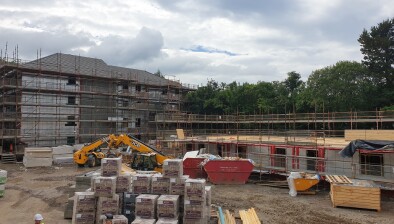Housing Investment Taskforce calls for bold action to attract funding and tackle emergency

A new report by the Scottish Government’s Housing Investment Taskforce has laid out an ambitious roadmap to boost confidence and unlock greater investment across Scotland’s housing sector.
The proposals aim to address the country’s escalating housing emergency by encouraging more public-private partnerships and long-term strategic planning.
Chaired by housing minister Paul McLennan and supported by stakeholders from across the housing and investment landscape, the Taskforce was convened in 2023 to develop strategies that would make Scotland a more attractive destination for housing investment. The resulting report includes recommendations spanning social, affordable, and private housing sectors.
The report’s far-reaching recommendations include:
- Recognising housing as critical infrastructure.
- Attracting private capital to supplement public investment in affordable housing.
- Creating more favourable conditions for Mid-Market Rent (MMR) homes by exempting them from rent controls.
- Exploring the potential of for-profit models to deliver affordable housing.
- Supporting a more entrepreneurial approach from public bodies.
- Ensuring the planning system facilitates, rather than hinders, housing delivery.
Welcoming the report, housing minister Paul McLennan said: “It is my ambition, shared by the members of the Housing Investment Taskforce, to make Scotland the best place for housing investment. The report has identified a range of actions to support more investment across all tenures of the housing system to meet Scotland’s growth potential.
“We’re taking forward these recommendations in the Programme for Government and will work in partnership with taskforce members and other organisations to grow investor confidence to support the delivery of more homes across Scotland.”
The Housing Investment Taskforce report comes amid a backdrop of pressing need. Over 693,000 households in Scotland are currently experiencing some form of housing need, and more than half of the population lives in areas affected by local housing emergencies.
The Scottish Government has committed to delivering 110,000 affordable homes by 2032, including 77,000 for social rent. But with growing cost pressures, inflation, and limited public budgets, the delivery of this target depends increasingly on leveraging private investment.
The Taskforce’s report draws on international evidence highlighting innovative approaches to financing affordable housing, underscoring the importance of aligning public sector frameworks with investor requirements while maintaining affordability and public good.
The response from housing developers and private sector stakeholders has been overwhelmingly supportive, while the social housing sector voiced caution on private finance replacing public investment.
James Blakey, planning director at Moda Group, praised the collaborative effort behind the report: “Addressing the housing emergency needs bold, imaginative and concrete actions… creating market certainty and viability is key to attracting crucial investment.”
Karen Campbell, communications director at Springfield, echoed this sentiment: “The report is clear on the value in building confidence, supporting new partnerships, and creating the economic opportunity to unlock new and existing investment in Scotland.”
Fionna Kell, director of policy at Homes for Scotland, welcomed the report as a much-needed step forward.
“With it now over a year since the declaration of a national housing emergency which has seen over half of the Scottish population now living in areas within local housing emergencies, the publication of today’s report and response from the Scottish Government confirming they will take forward the report’s recommendations is to be welcomed,” she said.
“The Taskforce’s report rightly recognises the urgent need for bold, co-ordinated and interventionist action to create the appropriate regulatory conditions necessary for housing investment and importantly, delivery across all tenures to thrive. With 693,000 households living in some form of housing need, the report has identified many of the key barriers that the home building sector has flagged consistently, from planning delays and infrastructure costs to regulatory uncertainty fundamentally impacting development capacity.
“It is therefore pleasing to see recommendations to ensure the planning system becomes an enabler for increased supply and more efficient decision timeframes, alongside the call for clear, consistent long-term policy whether this be through the exemptions made to Build to Rent and Mid Market Rent properties in the Housing (Scotland) Bill, or consideration of new finance models for delivering infrastructure.
“We are encouraged by the Taskforce’s emphasis on collaboration and innovation. However, what is now required is the political will to switch rhetoric to delivery and as ever, HFS and its members stand ready to play their part in increasing the supply of high-quality, energy efficient and affordable homes across all tenures to tackle the housing emergency and provide their crucial expertise on how Scotland’s regulatory framework can deliver rather than block the new homes so desperately needed by Scotland’s people.”
The Scottish Federation of Housing Associations (SFHA) expressed concern that an overreliance on private finance could undermine the affordability and long-term sustainability of social housing.
SFHA chief executive Sally Thomas stated: “It’s welcome that the taskforce report recognises housing as critical infrastructure, accepts that we need long-term funding commitments and also recommends exempting Mid-Market Rent homes from rent controls. These are all sensible positions and we hope we will now see swift action to provide certainty to MMR providers through an amendment to the Housing Bill.
“In terms of some of the report’s other recommendations, it’s worth noting that the role of private finance in delivering social homes is to supplement the funding that not-for profit housing associations receive from government. Our members then reinvest any surplus into tenants’ homes.
“This tried and tested model is what keeps rents affordable for tenants and is why rents in the social sector average half the amount in the private rented sector.
“So, whilst we welcome any efforts to increase investment in housing, we must bear in mind that the single biggest roadblock to building more social homes is a lack of certainty on long-term public funding. Private finance alone cannot end the housing emergency: what we need to see is a long-term funding plan for social housing with public money combined with private investment, as would be the case for other types of critical infrastructure essential for the functioning of the country.”
CIH Scotland also offered a cautiously optimistic endorsement. While supportive of the overall ambition and many of the proposals, CIH Scotland noted the need for more clarity on the proposed introduction of for-profit affordable housing providers.
“The Chartered Institute of Housing Scotland welcomes and supports the aims of the Housing Investment Taskforce, as defined in its report published today,” the organisation stated. “The ambition to further capitalise on home building in Scotland is crucial to addressing the housing emergency and delivering the 110,000 social and affordable homes Scotland needs by 2032.”
CIH Scotland added: “An initial review of the recommendations suggests a number of sensible short-term and long-term proposals that would provide greater confidence to the home building sector. This includes greater assurance for the delivery of mid-market rent properties and a long-term commitment to a minimum level of funding for new affordable housing supply. We hope the Scottish Government is able to move quickly to support these recommendations.
“However, some of the recommendations require more detail and in particular we would like more information on the risk/ benefit of a ‘for profit’ provider of affordable homes in Scotland before we are convinced of its merit. Scotland has a successful structure for the delivery of social and affordable housing - the challenge is that funding from the state is increasingly not covering a proportionate share of the costs. We are wary about models that may risk increased financialisation of the sector, which in turn would mean higher long-term rents for tenants.
“The report is very welcome in setting out the challenges we have delivering our housing ambition against the existing housing finance system. It also rightly recognises the interdependencies and challenges operating across the UK housing system as a whole. We hope that the Scottish Government response will set out a complete consideration of housing taxation and finance so we can deliver the social and affordable homes that Scotland needs.”

















